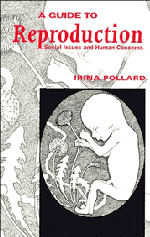Book contents
- Frontmatter
- Contents
- Preface and acknowledgements
- Part one Reproductive biology
- Part two Reproduction and social issues
- 13 Population dynamics, stress and the general theory of adaptation
- 14 Extinctions and the conservation of endangered species
- 15 Artificial control of fertility
- 16 Hormonal contributions to errors of sexual differentiation
- 17 The acquired immunodeficiency syndrome (AIDS) epidemic: a global emergency
- 18 The effect of nutrition and exercise on the hypothalamic–pituitary–gonadal axis
- 19 Principles of teratology and an update on nicotine, ethanol and caffeine abuse
- 20 Ethical aspects of human reproductive biology
- Index
16 - Hormonal contributions to errors of sexual differentiation
Published online by Cambridge University Press: 05 June 2012
- Frontmatter
- Contents
- Preface and acknowledgements
- Part one Reproductive biology
- Part two Reproduction and social issues
- 13 Population dynamics, stress and the general theory of adaptation
- 14 Extinctions and the conservation of endangered species
- 15 Artificial control of fertility
- 16 Hormonal contributions to errors of sexual differentiation
- 17 The acquired immunodeficiency syndrome (AIDS) epidemic: a global emergency
- 18 The effect of nutrition and exercise on the hypothalamic–pituitary–gonadal axis
- 19 Principles of teratology and an update on nicotine, ethanol and caffeine abuse
- 20 Ethical aspects of human reproductive biology
- Index
Summary
Errors of sexual differentiation were among the first human birth defects to be recognized. Since antiquity, individuals with genital anomalies were either deified or ridiculed (Hermaphródîtes was the son of Hermes and Aphrodite who became united in body with the nymph Salmacis while bathing in a fountain). Fortunately, scientific understanding of the etiology, pathogenesis and management of errors of sexual differentiation has improved in the last 2000 or so years. Congenital anomalies, which result in failure to achieve normal sexual dimorphism, may be due to intrinsic defects in gene expression and/or epigenetic modifications of normal gene expression. Genetic defects of sexual differentiation are inherited by Mendelian patterns of inheritance, that is, autosomal dominant, autosomal recessive or sex-linked. Examples of genetic errors causing pseudoherma-phroditism can be found in Chapter 2 alongside a description of the orderly process of normal sexual differentiation. This chapter is concerned with potential teratogenic derangements in sexual differentiation resulting from therapeutically introduced or environmentally derived steroid-like compounds and highlights the sensitivity of the reproductive system to early stimulation by hormonally active xenobiotics. Epigenetic factors can operate at any time during sexual differentiation and can cause developmental abnormalities which may not be evident until puberty or old age. Mechanisms underlying biochemical teratology are further discussed in Chapter 19.
The term Dice syndrome (the roll of the dice) describes the random exposure of any individual to unsuspected disturbing influences of environmental origin. A special form of Dice syndrome is iatrogenic disease, meaning originating from the physician and, by analogy, any intervention inadvertently deviating a developmental process.
- Type
- Chapter
- Information
- A Guide to ReproductionSocial Issues and Human Concerns, pp. 307 - 319Publisher: Cambridge University PressPrint publication year: 1994
- 1
- Cited by



